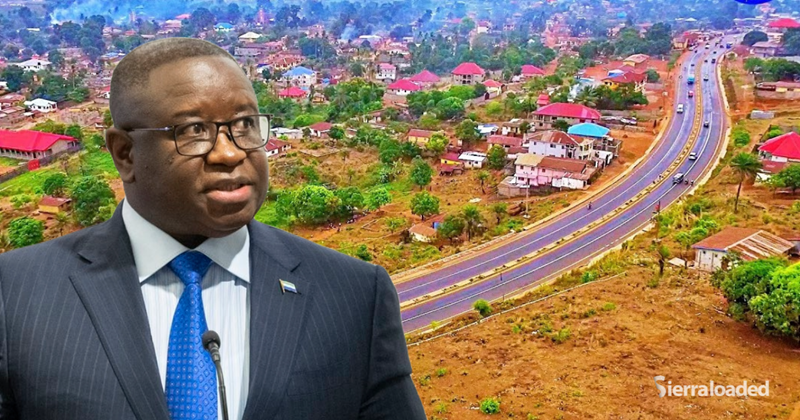With the recent signing of the Finance Act 2024 by President Julius Maada Bio, Sierra Leone is poised to enter a period of unprecedented economic strain.
While the Act aims to enhance revenue through various fiscal measures, the projected burden on everyday Sierra Leoneans cannot be overlooked.
These new provisions appear, on the surface, to stimulate fiscal health, but a closer analysis reveals that they could deepen economic hardships for a population already facing severe economic challenges.
Below is an analysis of the Finance Act
2024 and its implications
- Import Duty on Essential Commodities The Finance Act 2024 introduces a 5% import duty on rice, Sierra Leone’s staple food, which will increase to 10% by 2025.
This alone has dire implications. For many families, rice represents a significant portion of their diet, and this duty will directly raise the cost of living. By 2025, rice could become financially inaccessible for many households, exacerbating food insecurity and poverty.
In addition, increased import duties on cement (20%), cooking gas (5%), and iron rods (10%) will raise the cost of construction, heating, and basic household items. The ripple effect will likely stall infrastructure projects and make it nearly impossible for families to afford housing and other essentials, further deepening the housing crisis.
- Expanded Taxation on Digital Services Taxing revenue from digital companies like Google and Meta may seem forward-thinking, but this cost is ultimately passed down- to the consumer. As Sierra Leone becomes increasingly digital, this tax could deter foreign companies from offering services, limiting Sierra Leoneans’ access to essential digital tools and further hindering economic participation in the global market.
- Withholding Tax Increases • The adjustment of withholding taxes on dividends, professional fees, and lottery winnings to 15% further constrains personal income for those who rely on these earnings.
For instance, skilled professionals who perform essential services may see. an increased tax burden, pushing them closer to economic strain.
- Education Levy and Increased
Contractor Tax Rates
The 1% education levy and increase in contractor withholding tax rates to 6.5% (residents) and 11.5% (non-residents) could make it challenging for contractors and builders to operate profitably. As education is vital to long-term growth, this levy seems promising, but its timing and rate increase on already-struggling businesses could force many contractors to downscale or halt operations, ultimately slowing educational and developmental progress.
- Increased Excise Duties on Essential Goods
The harmonization of excise duty and introduction of excise taxes on items like plastic products and gambling will raise prices in multiple sectors. Taxing plastic products, though environmentally conscious, may inadvertently increase the cost of packaging for everyday goods, a cost which will inevitably fall on consumers.
Projected Outcome: Economic Crisis by 2025
By increasing the tax burden across essential and everyday goods, the Finance Act 2024 risks a sharp increase in living costs, reduced consumer spending power, and limited business profitability, factors which collectively can fuel inflation and economic stagnation. For a nation already facing high poverty rates, these policies may push Sierra Leone’s economy into a period of extreme hardship.
Without careful reconsideration of these measures, the suffering in Sierra Leone will likely quadruple by 2025. This anticipated financial strain demands proactive intervention, including potential revisions of the Minance Act’s provisions to prioritize the well-being of citizens. Policies must balance the government’s need for revenue with the population’s capacity to endure additional economic burdens. To prevent further destabilization, a re-evaluation focusing on sustainable growth and inclusive economic reform is critical.
If unaddressed, these fiscal changes could drive up poverty levels, worsen inequality, and place an insurmountable strain on already struggling households. By adopting a more balanced approach, Sierra Leone can pursue economic stability without sacrificing the welfare of its people. It is imperative for policymakers to consider the long-term impact of these decisions to secure a more equitable future for all Sierra Leoneans.












How can this thing happens again, because according to the analysis they said president Bio is the best president ever in the history of sierra Leone.
Why people are raising comment about the hardship of the country.
Justices shall prevail in to that country, this guy makes the youths of sierra Leone are moving in different African countries because of the hardship of the country.
Majority loss their lives alone the journey.
Inshallah justices shall tell one day.
From the frying pot to the fire this is how we live in sierra Leone now
So, does it mean that there is no hope for the poor Sierra Leoneans in the 2024 Finance Act?
Please be more balanced in your analyses in future
Thanks,
Gershon
Where are the so called Advisers to H.E. and the finance minister that should tell him that this F. Bill will bring untold suffering to the poor masses. I would like H.E. himself to be moving around Freetown and the Provinces to hear the cry of his people rather than relying on his Advisers who are not feeling the pinch.